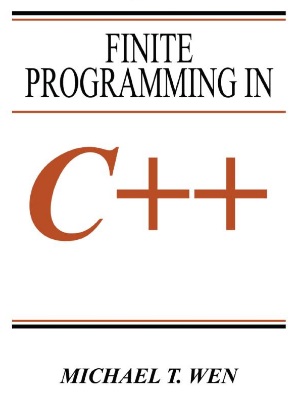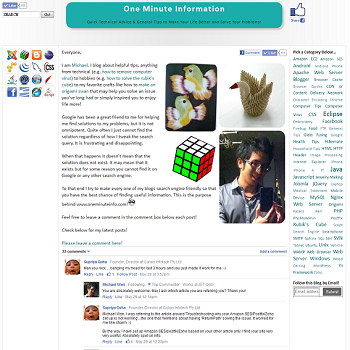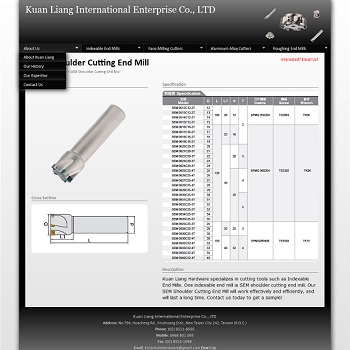Finite Programming in C++
 Amazon
Finite Programming in C++ is a book published by Michael. It is available on big online bookstores such as Amazon!
Amazon
Finite Programming in C++ is a book published by Michael. It is available on big online bookstores such as Amazon!
Its ISBN-10 is 0595351891 and ISBN-13 is 978-0595351893.
I've put the contents of the book on the website Practical Programming in C++!
During the summer of 2003 I took the initiative to write a book on practical programming in C++. The motivation was that I saw so many of my fellow students who, regardless of how hard they worked, usually ran into trouble getting their programs to work correctly.
I have developed a four-step model to program which has worked well for me, so I wanted to share it with other programmers and developers who are relatively new to programming in particular. I hope by sharing with them my programming techniques, they could learn to program efficiently and to avoid mistakes I tended to make in the past.
While writing it I made sure it is not too boring like some academic texts and I incorporated jokes and interesting world facts to provide incentive so that they are more likely to read on.
Also the book cannot be too long like some tome (rhymes with 'tomb'...) you find in a bookstore. I am glad to say that the book is only 250-page long and is packed with knowledge. As you can see, writing a good book is one thing, writing a book able to attract attention is another.
Here is a synopsis of the book:
Finite Programming in C++ first presents an overview of
basic program elements and dispels common misconceptions. Then it equips you with vital tools in C++, including the Standard
Template Library and C++ string class, while alerting you to the lurking pitfalls and ways to avoid them.
Finally it introduces a four-step programming model that has helped the author write programs efficiently and enjoyably.
Finite Programming in C++ incorporates occasional jokes and interesting world facts to lighten readers' mood while ensuring proper, detailed coverage of each topic.
The blithe tone, occasional jokes and interesting facts, cogent examples, and a wealth of challenging exercises, together make Finite Programming in C++ one of its kind.
Below is a list of short descriptions of what each chapter covers:
Finally it introduces a four-step programming model that has helped the author write programs efficiently and enjoyably.
Finite Programming in C++ incorporates occasional jokes and interesting world facts to lighten readers' mood while ensuring proper, detailed coverage of each topic.
The blithe tone, occasional jokes and interesting facts, cogent examples, and a wealth of challenging exercises, together make Finite Programming in C++ one of its kind.
- Chapter 1 - why naming conventions are important and how adopting one can avoid potential bugs
- Chapter 2 - general misconceptions in programming
- Chapter 3 - traps and tips involving the use of a class
- Chapter 4 - traps and tips involving the use of a function
- Chapter 5 - introduction of bugs and how to debug efficiently
- Chapter 6 - differences between arrays and pointers and how to dynamically allocate memory
- Chapter 7 - what STL is and how to use it
- Chapter 8 - how to use C++ string class
- Chapter 9 - introduction of segmentation fault and how to avoid it
- Chapter 10 - layout of a typical program and why it is important
- Chapter 11 - characteristics of a good program and the 4-step model of writing a good program
- Chapter 12 - characteristics of a good function and the 4-step model of writing a good function
- Chapter 13 - importance of documentation
- Chapter 14 - a collection of program fragments for readers to practice debugging
- Chapter 15 - a collection of programming assignments for exercise
- Chapter 16 - a list of big traps and tips
- Appendix A - C++ keywords so that readers will be careful not to use them for any other purpose
- Appendix B - operator precedence so that readers know the order of evaluations in an expression
- Appendix C - small, useful functions that perform common tasks such as showing the running time of a program and tokenizing a string
- Appendix D - a list of small traps and tips
- Appendix E - online resources for readers' reference
- Final Word - my final word of advice to readers
- Reference - the references I used in writing this book
Enjoy the following random pages..
 This website gives you tips on technical subjects and general topics!
This website gives you tips on technical subjects and general topics!
 This website is for a resort hotel situated in Jiaoxi, Taiwan.
This website is for a resort hotel situated in Jiaoxi, Taiwan.
 This website is for Jeantour, a travel agency in Taipei, Taiwan.
This website is for Jeantour, a travel agency in Taipei, Taiwan.
 This website is for a Taiwanese company who produces quality end mills and cutters.
This website is for a Taiwanese company who produces quality end mills and cutters.

